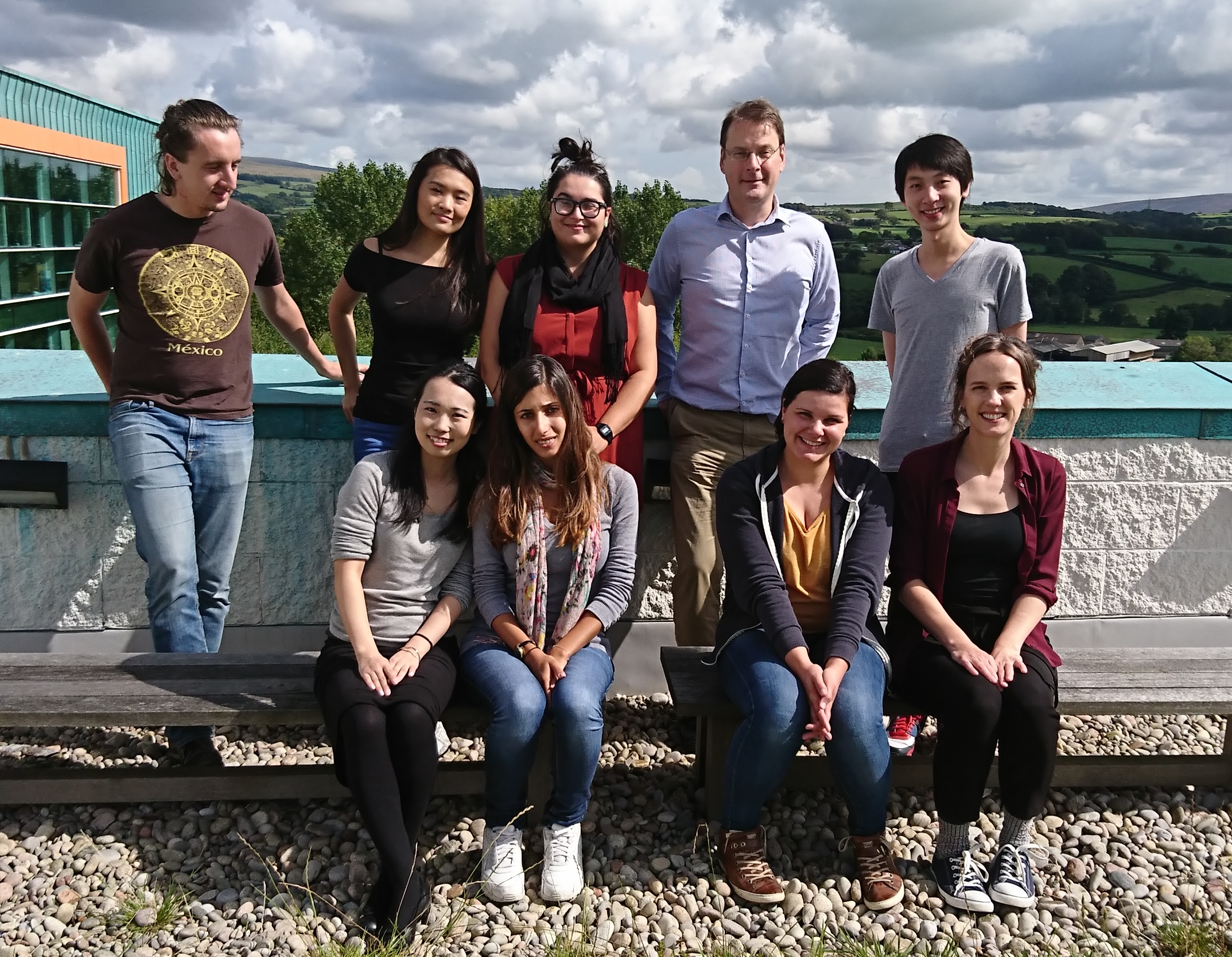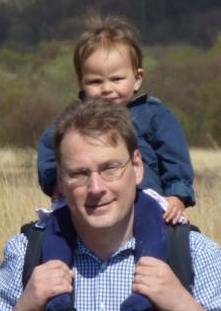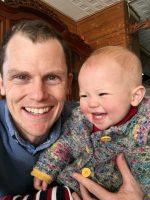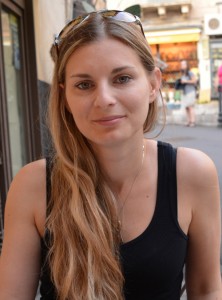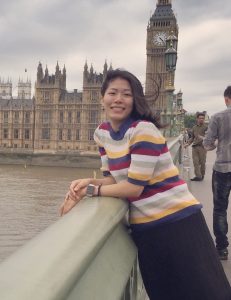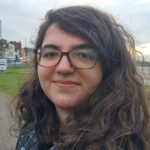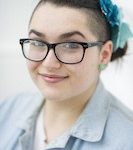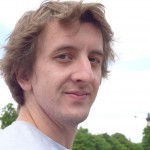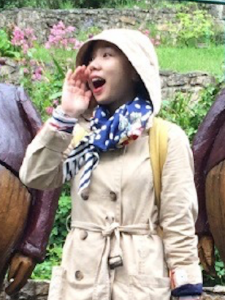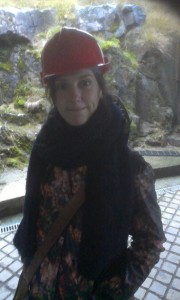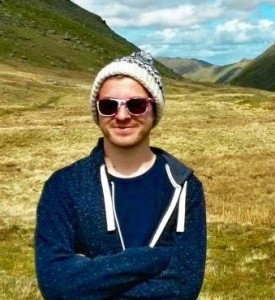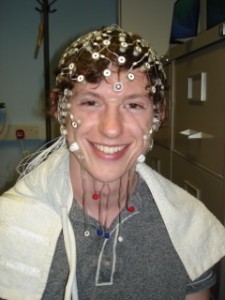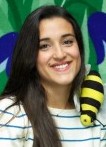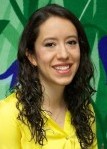I am Professor of Psychology at Lancaster University. My research is mainly concerned with early cognitive and language development but also with the question of how development shapes cognitive processing in adults. In my work I combine empirical approaches such as eye tracking of infants with computational modelling to build theories of cognitive change through development. Two of my main research strands are the development of ‘curiosity-based learning’ – the question of how infants explore their environment based on their intrinsic motivation to learn – and the transition from preverbal to language-based cognition – to understand how children learn about the world before the onset of language at the end of the first year of life, and how language then shapes and enriches this early knowledge. I’m the Director of the Leverhulme Doctoral Scholarship Programme in Interdisciplinary Research on Infant Development which offered a total of 22 fully funded PhD studentships from 2015 to 2021, and the Lancaster director of the ESRC International Centre for Language and Communicative Development (LiCiD) between the universities of Manchester, Lancaster and Liverpool.
I studied Computer Science, Linguistics and Psychology in Braunschweig, Germany and Austin, TX, before combining all three in a PhD in Cognitive Science from the University of Edinburgh. Before coming to Lancaster in 2011 I worked at the Sony Computer Science Lab in Paris, Birkbeck College in London, and Oxford Brookes University. From January to July 2013 I was a Lichtenberg Fellow at the University of Göttingen, Germany and from 2016 to 2017 a British Academy/Leverhulme Trust Senior Research Fellow.
In my free time I explore the beautiful Lancashire countryside with my family or travel further afield to Germany (where I’m from) and Taiwan (where my wife is from).
I completed my PhD at Lancaster University before starting my current role here as a Senior Research Associate, as part of the Economic and Social Research Council International Centre for Language and Communicative Development (LuCiD). My primary research interest is in word learning in developmental language disorder (DLD). Children with DLD show language deficits in the absence of any clear biomedical cause. My PhD research used meta-analysis, artificial neural networks, and Bayesian hierarchical modelling to look at how lexical acquisition and processing differ in typically developing children and children with DLD, with the broad aim of informing approaches to assessment and intervention. Since completing my PhD, I have been working on applying predictive processing theory to the study of DLD, and researching language impairments in children with autism.
I am interested in the visual aspects of categorisation. Images from different categories, such as animals and vehicles seem to elicit differential brain activity even during the early stages of visual processing. My research is into the role of top-down and bottom up factors that contribute to these early differences in category processing. I use electrophysiology (EEG) and analyse early visual event-related potentials to assess this question.
I studied both psychology and biology (Szeged, Hungary). I started to work with EEG during my psychology master studies. After the graduation I worked as a manager of an EEG lab at the Eotvos Lorand University (Budapest, Hungary) and as a lab assistant at the CEU Babylab (Central European University, Budapest, Hungary). I tested both adult and infant participants for EEG experiments. During this time I also ran my own experiments. I started my PhD studies at Lancaster University in 2013.
In my free time I like to read, watch movies and play with my cats.
For my PhD, I am studying the curiosity-driven learning mechanisms of infants. Curiosity as a basic component of cognition plays a role of creating motivation in our learning. People learn more when they are curious than when they are not. My research interests will focus on how curiosity enhances infants’ learning and what the behavioural and neural mechanisms behind this are. I will be using interdisciplinary methods to explore the answers to these questions. Before I completed my MSc in Developmental disorders at Lancaster University in 2017, I worked with autistic children for almost two years. After graduation from Lancaster University, I worked as a research assistant at a brain institute (BCBDI, Shenzhen).
Didar Karadag
I am interested in knowledge acquisition and transmission processes in infants and young children. My current research investigates the emergence of infants’ early information transmission behaviour, the type of information that they prefer to transmit others, and the underlying motivations that may drive this behaviour. I will be using interdisciplinary tools to explore these research interests.
Prior to my doctoral studies at Lancaster University, I received my B.A. and M.A. degrees from Boğaziçi University, Turkey. My master’s thesis explored the selectivity in children’s information transmission by focusing on the role of group affiliation of the recipients and the type of information transmitted. During my studies, I worked as a lab manager in Psycholinguistics Research Lab and Baby and Child Development Lab at Boğaziçi University. I conducted studies with developmentally typical infants and children, as well as adolescents and adults using mostly behavioural methods. I am excited to be part of the Psychology Department at Lancaster University and to pursue my research interests in one of the greatest baby labs in Europe!
Marina Bazhydai
Marina was a Leverhulme Trust Doctoral Scholar in our lab and completed her PhD in June 2020. She now works as a Research Associate with Gert on a project on curiosity-based word learning. From August 2020 she is a lecturer in our Department.
Marina is interested in using interdisciplinary methods to investigate the developmental precursors of social communication and knowledge transmission in preverbal infants. My current project looks at social engagement initiation by infants in presence of various social and non-social stimuli. I am also interested in infants’ active use of ostensive cues to provide information to ignorant others in situations of unequal distribution of knowledge. My interest in these topics has grown out of my graduate coursework in Human Development and Psychology at the Harvard Graduate School of Education and research experience at Harvard and Yale developmental psychology labs.
I did my MSc under the guidance of Gert in 2014/15, and returned to do a PhD in 2017. I’m interested in how emotions perceived by infants affect their word learning.
In daily life, on one side, everyone expresses their emotions during communication, especially when we talk to babies. On the other side, infants learned word-world mappings through observing others’ behaviours, listening to words that others talk to them as well as experiencing interactions with others. How do babies absorb information expressed in different emotions? Do different emotions have different effects on infants’ word learning? I hope to find out the answers to thses questions, so I come back to Lancaster University and try to use eye-tracking, EEG and Perhaps fNIR to investigate these questions.
Jacky completed his Masters degree in our lab in 2016 where he studied the link between language and categorisation in young infants. In his PhD, also at Lancaster, he studied word learning in bilingual children. He is now a postdoc with Silke Brandt in Lancaster’s Department of Linguistics and he just stays in our lab because he likes it so much.
I am a PhD student at Lancaster University, continuing from my Psychology BSc also at Lancaster. My research investigates word learning in children with Autism Spectrum Disorder (ASD). Restricted and repetitive behaviours and interests are defining characteristics of ASD, which affect the ability of children with ASD to engage with their environment, and consequently learn language. My research aims to investigate the relationship between atypical attentional mechanisms in ASD, and linguistic deficits. This will be done using interactive touch screens, giving the opportunity to obtain data through behavioural methods such as reaction times and coding, as well as eye-tracking. Ultimately, this project will advance understanding of language deficits in ASD, and could inform educational interventions by combining preferential interests and linguistic tasks to enhance vocabulary development.
Alumni
Priya Silverstein
Priya completed her PhD in our lab in July 2020. Her PhD set out to study how infants comprehend pointing gestures. The ability to refer to objects and events is one of the most important parts of human communication. Around 10-14 months, infants start to produce their first words, and by 11 months they produce their first pointing gestures. My PhD will be focused on the question of whether or not infants understand that pointing gestures are referential (i.e., that the gesturer intends to refer to something by using this gesture). I will be using near-infrared spectroscopy (NIRS) and electroencephalography (EEG) to answer this question. Before coming to Lancaster, I completed my undergraduate and master’s degrees at Aston University (studying psychology and then cognitive neuroscience). I also worked as a research assistant at the University of Warwick Communication Development Lab. This is what got me interested in infant research, and specifically how it can help us understand the development and evolution of communication.
Shirley completed her PhD in our lab in November 2019.
I explore phonemic perception in monolinguals and bilinguals. Phonemes are small units of sound in a language that distinguish one word from another, for example, /b/ and /p/ in ‘bill’ and ‘pill’. By 10-12 months of age, monolingual infants are no longer sensitive to phonemic contrasts that belong outside of their native language. However, studies have shown that bilinguals still retain this perceptual flexibility given the greater variability in their language input. The exact location of where it occurs in the brain has not been clearly shown.
I use functional near-infrared spectroscopy (fNIRS) to locate the cortical regions involved in processing native and non-native phonemes in infants and adults. fNIRS is a non-invasive neuroimaging technique that measures blood-oxygen levels at the surface of the cortex using infrared light.
Arthur Capelier-Mourguy
Arthur completed his PhD in our lab in February 2020.
At a very young age, infants can form many categories and attach linguistic labels to these categories, as well as specific information about these categories (sound features, motion patterns, and so on). It is particularly amazing that children manage to deal with possibly contradictory information, knowing that a dog is also an animal, whereas an animal is not always a dog, and can in fact be very different from a dog.
My PhD focuses on the understanding and modeling of the mechanisms by which infants learn different levels of category, and how adding a linguistic label can help them categorizing objects at a proper level. It might indeed be the case that the repetition of the label “animal” paired with presentation of visually various animals would help infants focusing on the general properties that all this animals have in common, as well as the systematic presentation of many instances of dogs with differing subordinate labels would make them pay more attention to the specificities that make a Saint-Bernard different from a beagle.
I completed a bachelor in applied mathematics and cognitive sciences at the University of Bordeaux, then did my masters degree in Paris in the CogMaster (ENS, EHESS and University of Paris Descartes).I am now a Leverhulme Doctoral Scholar, supervised by Gert Westermann and Katie Twomey.
My out-research occupation includes dancing (salsa, ballroom, folk, etc.) and playing music mainly in Irish sessions.
Marina completed her PhD in our lab in December 2019.
Infants from a very young age enhance their learning through play, which I find very interesting as this is the main pathway towards learning for them. My PhD focuses on the understanding of how infants use their eye gaze during playing and labelling events of novel toys and whether physical interaction with a novel toy could facilitate labelling learning. For my study I am using a brand new eye-tracking technology. The head-mounted eye-trackers allow the infants to move naturally while the cameras capture the scene in front of them and where exactly they look. Therefore, this technology gives to the researchers the opportunity to study infant development in more naturalistic settings, which is fascinating.
I am coming from Cyprus and I studied Psychology in Education (BSc) and Developmental Disorders (MSc) at Lancaster University.
In my free time I do dancing (contemporary, salsa etc.) and I participate in dance performances with dance societies at the University. I also love travelling, nice coffee and good food, and of course Lancaster
Han was postdoc research associate in the lab and she is now doing her post doc in Nanyang Technological University in Singapore.
My research project looked at curiosity-driven learning in infants. Different from the laboratory-based developmental investigations, infants explore their learning environment freely driven by their own curiosity. Recent research predicted infants’ curiosity-driven exploration is systematic. My research project thus examines this predictions using various experiment technique such as 3D printing, free exploration task, and the cutting-edge head-mounted eye tracking.
My PhD topic is the neural correlates of children’s emotional body perception. By using EEG I investigated the neural mechanism of body schema perception, emotion processing from static body posture and dynamic body expression in children, as well as its development. I’m also interested in behavioural and neural synchrony in infant-adult interaction.
My out-research activities include writing psychology, science and gender equality articles for Chinese medias, as well as sketching and watercolour painting.
Katie was a postdoctoral researcher in the lab from 2014 to 2017 and she is now a lecturer at the University of Manchester.
I am fascinated by how young children form categories of objects and actions, how they learn words for these categories, and how multiple sources of information in the learning environment might affect these processes. For example, if a child sees a brown-and-white animal in a field, then plays with a black plastic toy animal at nursery, then sees a beige animal in a storybook, how does s/he know that all of these things are members of the same category, and are labelled with the word “cow”?
I investigate early categorisation and word learning empirically, in studies at Lancaster University Babylab, and computationally, using neural network models. I have also used robots to explore the relationship between the body and word learning. Other research interests include grammar acquisition and am about to start an exciting new project examining how infants’ curiosity drives their learning.
I completed my PhD in Psychology at the WORD Lab at the University of Sussex, followed by a post-doctoral position at the University of Liverpool. I am now a Senior Research Associate working under the umbrella of the ESRC International Centre for Language and Communicative Development (LuCiD).
When not entirely occupied by by being over-excited about science, I like planting things in my garden and letting them grow until the neighbours complain, then turning them into curry (the plants, not the neighbours).
 Rebecca Frost
Rebecca FrostIn my free time I like to read books and go to the theatre, but not at the same time because that would be antisocial.
Mikako did her MSc in the lab in 2016/17, and she is now back in Japan to continue her PhD.
My main research interest is young children’s scale errors. Scale error is a phenomenon in which children try to interact with miniature-sized objects as if they were normal-sized. My current Master’s project examines the link between scale error and infants’ categorization abilities. This research is supervised by Dr. Katie Twomey. My Master’s in Japan investigated how children’s cognitive abilities (i.e., planning, size concept) were associated with the occurrence of scale errors. My PhD in Japan investigated how children’s scale errors affected their language ability and pretend play throughout a longitudinal study.
Before I came here to study at Lancaster University, I worked as a part-time assistant for a research laboratory at Joetsu University of Education and the National Institute for Educational Policy Research in Japan. I was in charge of collecting experimental data on infants using eye-tracking technology, functional Near-Infrared Spectroscopy (fNIRS) and observational assessments (early social communication scales).
 Angel Tovar y Romo
Angel Tovar y Romo
Angel came to stay in the lab for two separate 1-year visits. He is now a lecturer at UNAM in Mexico City. He is working on computational models of atypical learning in Down syndrome.
 Gemma Taylor
Gemma Taylor
Gemma was a research associate as part of the ESRC Centre for Language and Communicative Development (LuCiD) at Lancaster University. She studied how infants transfer words learnt from 2D media to their 3D counterparts. She is now a lecturer at the University of Salford.
Matt was a PhD student supervised by Professor Gert Westermann. He worked on the cognitive processes by which children acquire language, but more specifically in the factors that help explain why language acquisition is so variable during early childhood. Specifically, on the effects of shyness on the processes that underpin early word learning. Now he works as a postdoc at Potsdam University in Germany.
Ben Malem
Ben was a student who worked as an intern during the summer under the guidance of Katie and Gert. He worked on an eye-tracking study that aimed to contribute to the area of Curiosity in Developmental Psychology.
Julia studied for a Masters in Developmental Psychology in 2014. Before she came to Lancaster she studied Psychology at the University of Granada, Spain. In the BabyLab she investigated how 12-month-old infants learn the association between sounds and novel objects.
Cecilia studied for an MSc in Developmental Psychology in 2014. Before coming to Lancaster she studied for a degree in psychology at the Universidad Iberoamericana in Mexico where she was born. In the Babylab she was working on her dissertation project that had the main objective of investigating how 24-month-olds learn and retain words related to adjectives or object properties.
Priyanka did her MSc in Developmental Psychology in 2014. She carried out research on emotion processing in 14-month-old infants.
